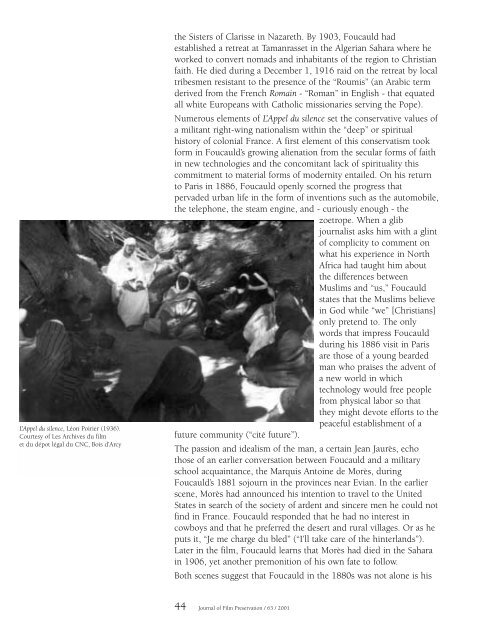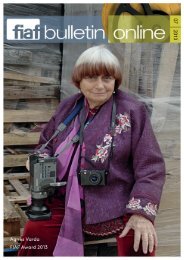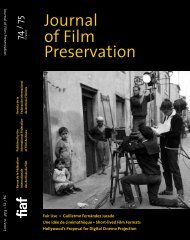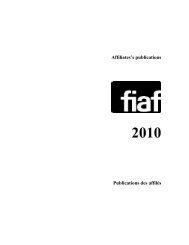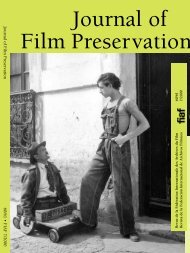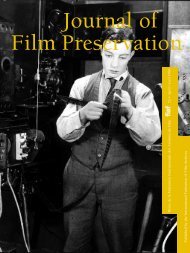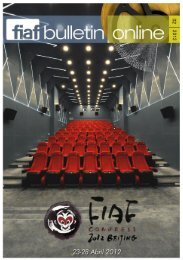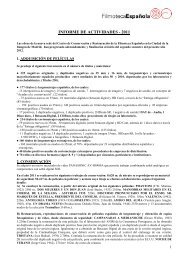Journal of Film Preservation - FIAF
Journal of Film Preservation - FIAF
Journal of Film Preservation - FIAF
You also want an ePaper? Increase the reach of your titles
YUMPU automatically turns print PDFs into web optimized ePapers that Google loves.
L’Appel du silence, Léon Poirier (1936).<br />
Courtesy <strong>of</strong> Les Archives du film<br />
et du dépot légal du CNC, Bois d’Arcy<br />
the Sisters <strong>of</strong> Clarisse in Nazareth. By 1903, Foucauld had<br />
established a retreat at Tamanrasset in the Algerian Sahara where he<br />
worked to convert nomads and inhabitants <strong>of</strong> the region to Christian<br />
faith. He died during a December 1, 1916 raid on the retreat by local<br />
tribesmen resistant to the presence <strong>of</strong> the “Roumis” (an Arabic term<br />
derived from the French Romain - “Roman” in English - that equated<br />
all white Europeans with Catholic missionaries serving the Pope).<br />
Numerous elements <strong>of</strong> L’Appel du silence set the conservative values <strong>of</strong><br />
a militant right-wing nationalism within the “deep” or spiritual<br />
history <strong>of</strong> colonial France. A first element <strong>of</strong> this conservatism took<br />
form in Foucauld’s growing alienation from the secular forms <strong>of</strong> faith<br />
in new technologies and the concomitant lack <strong>of</strong> spirituality this<br />
commitment to material forms <strong>of</strong> modernity entailed. On his return<br />
to Paris in 1886, Foucauld openly scorned the progress that<br />
pervaded urban life in the form <strong>of</strong> inventions such as the automobile,<br />
the telephone, the steam engine, and - curiously enough - the<br />
zoetrope. When a glib<br />
journalist asks him with a glint<br />
<strong>of</strong> complicity to comment on<br />
what his experience in North<br />
Africa had taught him about<br />
the differences between<br />
Muslims and “us,” Foucauld<br />
states that the Muslims believe<br />
in God while “we” [Christians]<br />
only pretend to. The only<br />
words that impress Foucauld<br />
during his 1886 visit in Paris<br />
are those <strong>of</strong> a young bearded<br />
man who praises the advent <strong>of</strong><br />
a new world in which<br />
technology would free people<br />
from physical labor so that<br />
they might devote efforts to the<br />
peaceful establishment <strong>of</strong> a<br />
future community (“cité future”).<br />
The passion and idealism <strong>of</strong> the man, a certain Jean Jaurès, echo<br />
those <strong>of</strong> an earlier conversation between Foucauld and a military<br />
school acquaintance, the Marquis Antoine de Morès, during<br />
Foucauld’s 1881 sojourn in the provinces near Evian. In the earlier<br />
scene, Morès had announced his intention to travel to the United<br />
States in search <strong>of</strong> the society <strong>of</strong> ardent and sincere men he could not<br />
find in France. Foucauld responded that he had no interest in<br />
cowboys and that he preferred the desert and rural villages. Or as he<br />
puts it, “Je me charge du bled” (“I’ll take care <strong>of</strong> the hinterlands”).<br />
Later in the film, Foucauld learns that Morès had died in the Sahara<br />
in 1906, yet another premonition <strong>of</strong> his own fate to follow.<br />
Both scenes suggest that Foucauld in the 1880s was not alone is his<br />
44 <strong>Journal</strong> <strong>of</strong> <strong>Film</strong> <strong>Preservation</strong> / 63 / 2001


